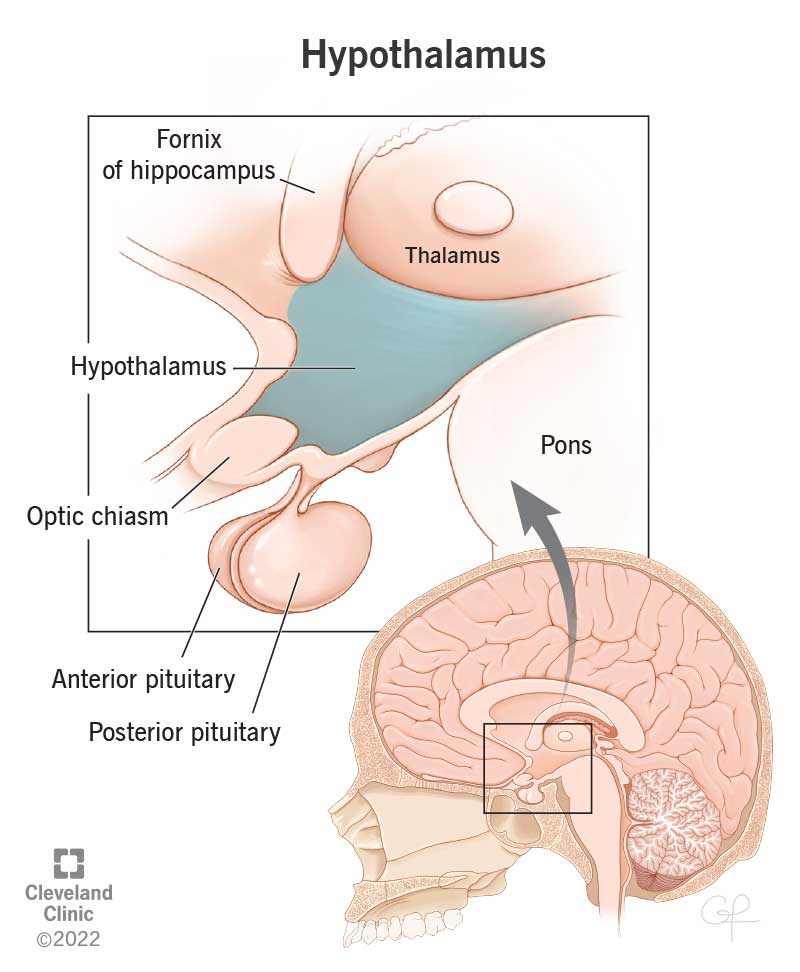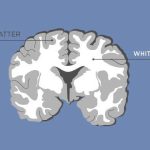Last Updated on 1 year by Francis
The hypothalamus plays a critical role in our body’s functioning and overall health. It is responsible for regulating many of our body’s important functions, including body temperature, hunger, thirst, sleep, emotions, and hormones. It is even involved in the regulation of the autonomic nervous system. In this article, we will explore the anatomy of the hypothalamus, its functions, and how it plays a role in homeostasis.
The hypothalamus is a small region located deep in the brain, below the thalamus. It’s responsible for producing hormones that affect many bodily functions, including hunger, thirst, fatigue, sleep, and body temperature. It also helps to regulate the autonomic nervous system, which influences the activity of the heart, lungs, and digestive system. The hypothalamus helps to control the secretion of hormones from the pituitary gland and interacts with other parts of the brain to regulate emotions, memory, and other cognitive processes.
Contents
What is the Hypothalamus and What Functions Does it Serve?
The hypothalamus is a small area of the brain located just above the brain stem. It plays an important role in regulating many of the body’s functions, including body temperature, hunger, thirst, and emotions. It also plays a role in controlling the pituitary gland, which is responsible for releasing important hormones into the body. The hypothalamus is responsible for a variety of functions, from maintaining homeostasis to regulating hormones.
The hypothalamus is made up of a number of different regions, each of which plays a different role in regulating the body. The anterior hypothalamus is responsible for regulating body temperature, thirst and hunger. The posterior hypothalamus is responsible for controlling emotions. The lateral hypothalamus is responsible for controlling the autonomic nervous system, which controls involuntary functions such as heart rate, breathing and digestion. The medial hypothalamus is responsible for controlling the pituitary gland, which releases hormones that control growth, metabolism and reproductive functions.
The hypothalamus is also responsible for producing hormones that act as chemical messengers. These hormones help to regulate a variety of body functions, such as appetite, thirst, body temperature, and sleep. The hypothalamus also plays a role in controlling the autonomic nervous system, which is responsible for controlling involuntary functions such as heart rate, breathing, and digestion.
How Does the Hypothalamus Affect Other Body Systems?
The hypothalamus plays an important role in regulating other body systems. It controls the pituitary gland, which releases hormones into the body that regulate growth, metabolism and reproduction. It also plays a role in controlling the autonomic nervous system, which is responsible for controlling involuntary functions such as heart rate, breathing and digestion.
The hypothalamus also produces hormones that act as chemical messengers. These hormones help to regulate a variety of body functions, such as appetite, thirst, body temperature, and sleep. The hypothalamus is also responsible for controlling the body’s response to stress, which can have a profound impact on overall health.
Finally, the hypothalamus is responsible for controlling the body’s circadian rhythm, which is the body’s internal clock that regulates when it should be awake and when it should be asleep. Disruptions to this rhythm can lead to a variety of health issues, such as fatigue, difficulty concentrating, difficulty sleeping, and depression.
What Happens When the Hypothalamus Is Damaged?
Damage to the hypothalamus can have a variety of effects on the body. Damage to the anterior hypothalamus can cause problems with regulating body temperature, thirst, and hunger. Damage to the posterior hypothalamus can lead to emotional disturbances, such as anxiety and depression. Damage to the lateral hypothalamus can cause problems with controlling the autonomic nervous system, which can lead to issues with heart rate, breathing and digestion.
Damage to the medial hypothalamus can lead to problems with the pituitary gland, which can cause issues with growth, metabolism, and reproductive functions. Damage to the hypothalamus can also cause disruptions to the body’s circadian rhythm, which can lead to fatigue, difficulty concentrating, difficulty sleeping, and depression.
How Is Hypothalamus Dysfunction Treated?
Hypothalamus dysfunction is typically treated with medications, such as antidepressants and antipsychotics. These medications can help to regulate the body’s hormones and regulate the body’s circadian rhythm, which can help to reduce fatigue, difficulty concentrating, difficulty sleeping, and depression.
In some cases, surgery may be necessary to correct hypothalamus dysfunction. Surgery may be used to remove tumors, repair damage to the hypothalamus, or correct abnormalities in the pituitary gland.
What Lifestyle Factors Can Affect the Hypothalamus?
Lifestyle factors can have a huge impact on the functioning of the hypothalamus. Stress can disrupt the body’s homeostasis and lead to hypothalamus dysfunction. Regular exercise and a balanced diet can help to keep the hypothalamus functioning properly. Exposure to bright light during the day can help to keep the hypothalamus’s circadian rhythm in check. Finally, getting enough sleep at night can help to keep the hypothalamus functioning properly.
Conclusion
The hypothalamus is a small area of the brain located just above the brain stem. It plays an important role in regulating many of the body’s functions, including body temperature, hunger, thirst, and emotions. It also plays a role in controlling the pituitary gland, which is responsible for releasing important hormones into the body. Damage to the hypothalamus can have a variety of effects on the body, and it is typically treated with medications and, in some cases, surgery. Finally, lifestyle factors can have a huge impact on the functioning of the hypothalamus, and it is important to maintain a healthy lifestyle to keep the hypothalamus functioning properly.
Few Frequently Asked Questions
What Is Hypothalamus Responsible For?
Answer: The hypothalamus is a region of the brain located just below the thalamus. It is responsible for regulating homeostasis, which includes maintaining a constant internal environment, controlling metabolism and hormone release, and controlling certain behaviors. It plays a major role in the body’s endocrine system, which is responsible for producing hormones that regulate various bodily functions, including growth, sexual maturation, and the sleep/wake cycle. It is also involved in the regulation of the autonomic nervous system, which controls basic functions such as breathing and heart rate.
What Role Does the Hypothalamus Play in the Endocrine System?
Answer: The hypothalamus is an important part of the body’s endocrine system, which is responsible for producing hormones that regulate various bodily functions, including growth, sexual maturation, and the sleep/wake cycle. The hypothalamus produces releasing and inhibiting hormones which control the release of hormones from other glands in the body, such as the pituitary gland and the thyroid gland. It also produces hormones of its own, such as oxytocin, which is involved in social bonding, and vasopressin, which helps regulate water balance in the body.
How Does the Hypothalamus Regulate Homeostasis?
Answer: The hypothalamus plays a major role in the regulation of homeostasis, which is the maintenance of a constant internal environment. It is responsible for monitoring and controlling the body’s temperature, blood pressure, and other important physiological functions. It also acts as an integrative center, receiving input from different parts of the body and sending out signals to other parts of the system in order to maintain the desired level of homeostasis.
What Are the Major Structures of the Hypothalamus?
Answer: The hypothalamus is composed of several distinct nuclei, or structures. These include the preoptic area, the paraventricular nucleus, the dorsomedial nucleus, the suprachiasmatic nucleus, the ventromedial nucleus, the lateral hypothalamic area, the arcuate nucleus, and the tuberal nucleus. Each of these structures plays a different role in the regulation of homeostasis, metabolism, and hormone release.
What Is the Role of the Hypothalamus in the Autonomic Nervous System?
Answer: The hypothalamus plays a major role in the regulation of the autonomic nervous system, which is responsible for controlling basic functions such as breathing and heart rate. It receives input from different parts of the body and sends out signals to other parts of the system in order to maintain a desired level of homeostasis. It is also involved in the regulation of the body’s stress response, and it can influence the body’s emotions and behavior.
What Hormones Does the Hypothalamus Produce?
Answer: The hypothalamus produces several hormones, including releasing and inhibiting hormones which control the release of hormones from other glands in the body, such as the pituitary gland and the thyroid gland. It also produces hormones of its own, such as oxytocin, which is involved in social bonding, and vasopressin, which helps regulate water balance in the body. Additionally, the hypothalamus produces hormones involved in the regulation of hunger, thirst, and body temperature.
What is the Hypothalamus and its Function? – Dr. Berg
The hypothalamus is part of the brain that is responsible for many essential bodily functions, from controlling the body’s temperature to regulating hormones that affect the body’s metabolism. It is essential in maintaining homeostasis and helping the body to remain in balance. Without a functioning hypothalamus, the body would not be able to remain in balance and maintain its vital functions. Therefore, it is clear that the hypothalamus is a vital part of the body and understanding its role in the body is essential for overall health.




.jpg)




